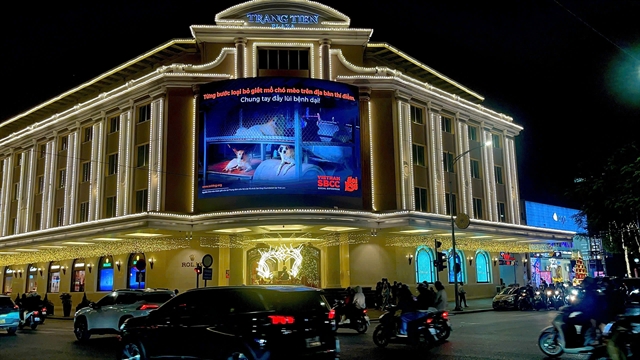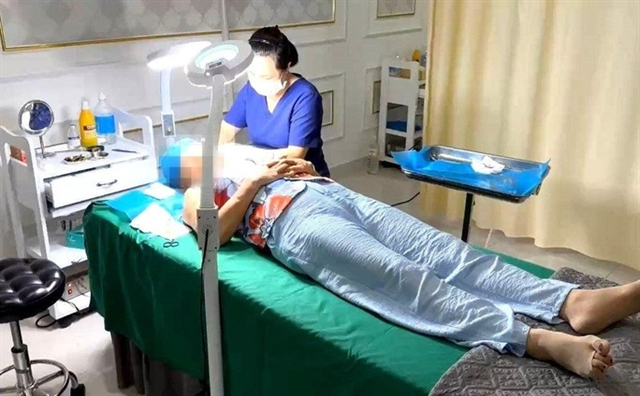 Society
Society

 |
| A cleaner at Kangzin plastic surgery centre in Đà Nẵng was found performing a facelift surgery for a customer. — Photo courtesy of nld.com.vn |
HÀ NỘI — On August 11, while inspecting a plastic surgery centre in Thanh Khê District, central Đà Nẵng City, police discovered a woman who works as a cleaner performing a facelift for a customer.
Neither the woman nor the centre could show licenses.
According to regulations, only hospitals and healthcare training facilities are given permission to offer training courses on non-invasive beauty treatments. However, a lot of spas and plastic surgery centres have trained their staff to become unprofessional plastic surgeons, leading to unpredictable consequences.
Dr Phạm Thị Việt Dung, head of the Plastic Surgery Department, Hà Nội Medical University, said: “We receive almost everyday patients with complications after having surgeries performed by unprofessional doctors at beauty centres.”
According to the report of Giao Thông (Transport) newspaper, a lot of filler injection training courses at beauty centres are advertised on social networks, lasting from one to three months and offering tuition fees from VNĐ7-20 million.
They commit that "students will practice on a human model and after graduation can open their own beauty salon”.
A Giao Thông newspaper reporter, disguised as a person seeking a filler injection training course, went to a training facility at an apartment building at 87 Lĩnh Nam, Hoàng Mai District, Hà Nội.
A woman who claimed to be the lecturer said after graduating from the University of Commerce, she started a spa business and then studied non-invasive beauty courses to become a teacher.
The course offered lasts from one to three months and students learn the theory of fillers, botox injections and other non-invasive beauty treatments.
Trainees will be taught how to deal with complications as well.
After finishing the theory, trainees can practice on mannequins about injection sites, injection methods, and appropriate needle types.
Trainees who master their skills can perform surgeries on real humans.
The teacher said they looked for the models online. After performing surgeries on real people, trainees will be completely confident to do their job.
Another training facility for basic filler injection on Hoàng Ngân Street, Hà Nội offers a 3-month course worth VNĐ15 million and promised trainees can open a spa after that.
The centre is committed to safe practices, saying that there have been no cases of complications among customers. The centre has also updated advanced techniques regularly for annual training for students in need.
Dr Dung from Hà Nội Medical University said plastic surgery services using medicine and equipment on the human body can only be performed at hospitals with plastic surgery departments or licensed plastic surgery clinics.
Citing a case of complication due to unlicensed plastic surgery, she said the patient permanently lost vision due to noselift filler injections causing occlusion. In this case, the lesions progressed very quickly and the patient did not recover.
Other women who want breast augmentation choose to inject filler of unknown origin at beauty facilities. Repeated infection in the breast area results in blood infection and the patients must have the whole mammary glands removed.
Others suffer from complications after taking the job as models at training institutions.
Most patients with complications trusted the beauty centres as they show certificates of professional training in cosmetology. But which competent authority issued the certificate is unclear.
Dr Phạm Duy Linh from the Vietnam Association of Plastic and Reconstructive Surgery said according to the health ministry’s regulations, only a few establishments under the management of the Ministry of Health, such as Hà Nội Medical University and dermatology hospitals have been licensed to open training courses on cosmetic dermatology.
The lecturers at these facilities are cosmetology experts who are trained in injecting fillers and botox.
Dr Linh said beauty salons with plastic surgery services have not been strictly managed. Spas, nail and hair beauty salons have mushroomed without the management of any healthcare agency.
In case of complications, they are ready to close and set up new centres, he said.
Speaking to Giao Thông newspaper, Hà Nội Department of Health’s inspectors said these plastic surgery centres are not under their management. They register with trade departments of districts and run as business facilities. — VNS




